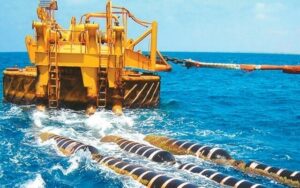The discussion on the electricity cable is being taken to a high political and diplomatic level today at the trilateral meeting in Athens between Greece, Cyprus and Israel.
The meeting is part of the broader cooperation between the three countries aimed at energy security, regional stability and defence cooperation. But it also coincides with rapid developments due to geopolitical entanglements in the mega electricity interconnection project, which since last week has been under a suspension of payments following a decision by the Greek government to limit ADMIE’s financial exposure to the project.
Discussions will be held at the level of foreign ministers as George Gerapetritis will receive his Republic of Cyprus counterparts Konstantinos Kombos and Israeli Foreign Minister Gideon Sa’ar at the Greek ministry. The latter will have a direct meeting with Prime Minister Kyriakos Mitsotakis late this afternoon.
The follow-up trilateral meeting will take place in Jerusalem in early April, indicating that contacts are entering a crucial phase.
Since last December, Israel has co-signed an agreement to strengthen strategic energy cooperation with Greece and there has been public support for the project and its importance from both Foreign Minister Eli Cohen, who visited Athens last December, and Tel Aviv’s Ambassador to Greece Noam Kats. In fact, his recent statement that the project creates a real connection and, compared to other initiatives, is closer to implementation is characteristic, which shows that Israel is determined to stick to the project and fight for it, even though it admits, according to the Israeli ambassador’s statements, that there are still many steps to go.
The short circuit of the GSI is a major concern for the three parties involved in the electrical cable, even though this is the first time that the interconnection has become the subject of broader discussion among them. Until recently, Israel’s role had been sidelined in public discussions, with disagreements and conflicts between ADMIE and the Republic of Cyprus dominating the debate.
However, the fate of the interconnection—which is struggling to be revived by playing every possible diplomatic card (and Israel holds influence due to its strong relationship with the new occupant of the White House)—reveals that the geopolitical risks were not properly assessed. Additionally, Turkey’s rigid stance or the Greek side’s diplomatic leverage proved to be weaker than initially estimated.
In any case, the progress of the project is not as expected, seemingly justifying Cyprus’ persistent demand for greater financial safeguards in case of project cancellation, as well as for its inclusion in the GSI’s shareholding structure—an issue that remains unresolved and is now effectively on hold until the future of the cable becomes clearer.
In recent days, the Cyprus Regulatory Authority also requested an update on ADMIE’s decision to halt payments to Nexans, the company manufacturing the cable. However, following a decision by the political leadership of the Greek Ministry of Energy and Environment, it was deemed appropriate not to send an official letter. Instead, a face-to-face briefing by ADMIE, with the participation of RAAEY (the Greek Regulatory Authority for Energy), is planned for the near future—once the government reshuffle is completed.
Ask me anything
Explore related questions





